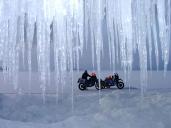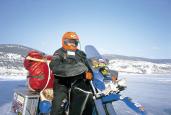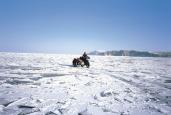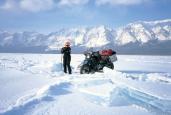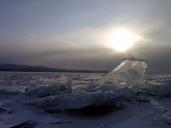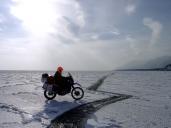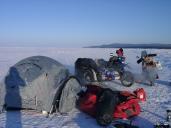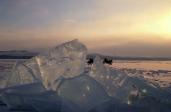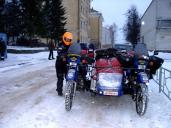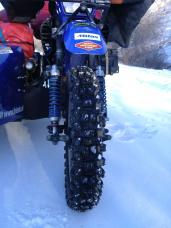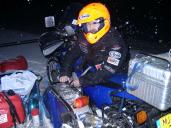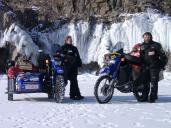Dafne & Rob de Jong in Sibirien
Riding a motorbike on snow is not enough for Dafne and Rob De Jong from the Netherlands. Riding a motorbike on snow and ice? Still not enough. Snow, ice and minus 40 degrees in Siberia - now it is an adventure!
Extreme stress for rider and material - a perfect test for our products. At temperatures that make normal piston rods brittle and break at the first hard impact and at temperatures where oils become so thick that shock absorbers could not move the Wilbers suspensions in their bikes are convincing.
In the deepest winter the two set out on the long journey to Irkutsk in Eastern Siberia, with the aim of travelling over 1,000km across the frozen Lake Baikal - the oldest, and with 1,625m deepest, freshwater lake on earth.
It was also planned to follow the frozen course of the river Lena for about 2,000 km, as frozen river courses like this one are officially opened for road traffic in the Siberian winter. However, the Lena could not be navigated this year due to heavy snow and ice floes, so they changed to the frozen surface of Lake Baikal already from Irkutsk.
The tour of the two was started with two Yamaha XT600E and a sidecar from Stern Gespannservice, which can also be combined to a "five-wheeler" (where the wheel of the sidecar is then folded up) with just a few hand movements. Finally, the steering heads are connected via a linkage to keep both motorbikes "on course". Additional winter safety was provided by a carburettor heater, which warmed up the carburettors before starting. This extended the starting time of the machines to 10 minutes per motorbike.
Neben weiteren Umbauten fanden auch sonderangefertigte Wilbers-Federbeine Anwendung.
In order to prepare for the strains, a cooling chamber was used for several hours and cooled down to minus 46 degrees. There we had to pitch the tent, lay out sleeping bags and mats, which were covered with sheepskins, cook soup and all of that with thick winter gloves.
The two were particularly enthusiastic about the hospitality they received. They never had to worry about where to sleep, and even when there was no room available, the wires were running hot among the residents' friends and acquaintances to find a comfortable place to spend the night. On the ice, they always found a place to sleep in their tent for the night. Tea water was fetched directly from the lake with an ice pick, which was made especially for them in a railway workshop - the price for the metalwork - two bottles of vodka.
Unfortunately the Siberian winter took its toll. After the two of them crossed the ice from Ust-Barguzin to Seberobaikalsk and travelled on to the island of Olhon, it started snowing. So it was impossible to find holes, cracks and thin ice between ice floes. So after about 1.000 kilometres on the ice they were forced to travel over land again.
If you are interested in further tours of the two of them, you can get more information on their Facebook page, or book your own adventure trip directly!






